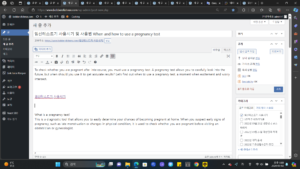To check whether you are pregnant after intercourse, you must use a pregnancy test. A pregnancy test allows you to carefully look into the future, but when should you use it to get accurate results? Let’s find out when to use a pregnancy test, a moment when excitement and worry intersect.

What is a pregnancy test?
This is a diagnostic tool that allows you to easily determine your chances of becoming pregnant at home. When you suspect early signs of pregnancy, such as late menstruation or changes in physical condition, it is used to check whether you are pregnant before visiting an obstetrician or gynecologist.
How does a pregnancy test determine pregnancy? When a fertilized egg implants in the uterine lining, the hormone hCG is secreted, and the pregnancy test strip is coated with antibodies that detect hCG. When you put urine on a test strip, if hCG is present, a line or symbol will appear, letting you know if you are pregnant.
The hCG hormone is found only in the female body and is secreted when a fertilized egg is implanted in the uterine lining.
When to use a pregnancy test
Although it has high precision, it may not respond properly if the timing is too early or too late. Therefore, in order to obtain accurate test results, you must know the appropriate time to use it.
When to use after the expected menstruation date
hCG is excreted in urine starting from the 4th week of pregnancy, and the amount sufficient to react on a test is excreted in the 5th week of pregnancy. It is recommended to use a pregnancy test one week after your period is due.
It is recommended to test with first urine in the morning, one week after the expected menstrual period. Read the product instructions carefully before use.
When to use a pregnancy test after intercourse
Typically, hCG hormone can be detected in urine about 10 to 14 days after fertilization. Therefore, you should use a pregnancy test about two weeks after intercourse. Early pregnancy symptoms may appear after 2 weeks, so you can determine whether you are pregnant by considering the symptoms along with the test results.
When do the first symptoms of pregnancy start?
It varies from person to person, but usually appears between the 4th and 6th weeks of pregnancy. In some cases, symptoms may begin for 2 weeks.
1. Implantation bleeding: A small amount of bleeding occurs when a fertilized egg implants in the uterine lining. It is smaller than menstrual blood, ends within 3 days, and is pink or brown in color.
2. You may feel tired and sleepy easily. Some people experience headaches.
3. The breasts may become swollen, sensitive, or painful.
4. Your body temperature may be slightly higher than usual.
5. You may end up hating the food you used to like, or you may come to like the food you used to hate.
Early pregnancy symptoms are very mild or similar to other symptoms, making it difficult to accurately tell if you are pregnant. If you suspect it is an early symptom, use a pregnancy test and visit an obstetrician/gynecologist.
Summary post
Test time: 1 week after the expected date of menstruation (approximately 2 weeks after intercourse)
Before the test: Read the tester user manual carefully, drink plenty of water, and use your first urine.
After the test: If you get a positive result, seek medical attention from a gynecologist. Even if you get a negative result, it is not 100% certain, so if you have any suspicious symptoms, get tested again or seek medical attention.
We learned about the use of a pregnancy test that can help you find out if you are pregnant. Although the accuracy is high, it is not 100% certain, so it is recommended to see an obstetrician/gynecologist for an accurate diagnosis.